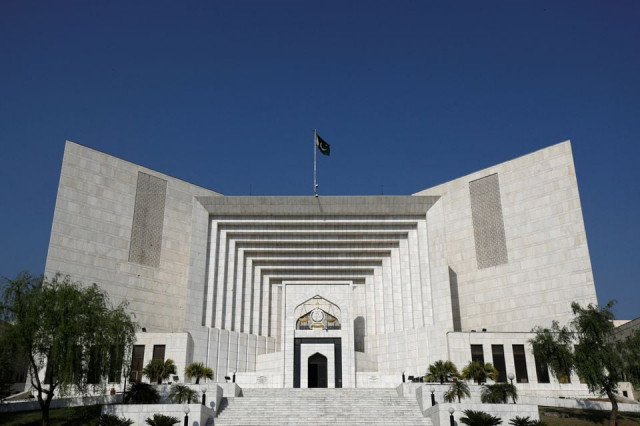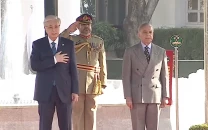SC defines scope of judicial interference
Top court says it can’t interfere by adopting its own interpretation

The Supreme Court has defined the scope of judicial interference in the award of an arbitrator, describing it as a final determination of a dispute between the parties involved.
“An arbitration award is a final determination of the dispute between the parties. The grounds for challenging an award are very limited,” read a six-page judgment authored by Justice Syed Mansoor Ali Shah while dismissing the National Highway Authority’s (NHA) petition against the award of Rs65,40,22 in favour of a construction company by an arbitrator in 2010.
“There are three broad areas on which an arbitration award is likely to be challenged i.e. first, jurisdictional grounds (non-existence of a valid and binding arbitration agreement); secondly, procedural grounds (failure to observe principles of natural justice) and thirdly, substantive grounds (the arbitrator making a mistake of law). The review of an arbitration award cannot constitute a re-assessment or reappraisal of the evidence by the court. An over-intrusive approach by courts in examination of the arbitral awards must be avoided,” it further stated.
A division bench of the apex court led by Justice Shah noted that the court was not supposed to sit as a court of appeal and must confine itself to the patent illegalities in the award, if any.
“The jurisdiction of the court under the Act (Arbitration Act, 1940) is supervisory in nature. Where two findings are possible, the court cannot interfere with the award by adopting its own interpretation. Interference is only possible if there exists any breach of duty or any irregularity of action which is not consistent with [the] general principles of equity and good conscience,” Justice Shah observed.
“The arbitrator alone is the judge of the quality as well as the quantity of the evidence. He is the final arbiter of dispute between the parties. He acts in a quasi-judicial manner and his decision is entitled to utmost respect and weight,” he added in the verdict.
“By applying the afore-noted principles of law on the subject and considering the petitioner’s objections within the limited scope of [a] court’s jurisdiction in testing the validity of [an] award, this court is not supposed to sit as a court of appeal and make a roving inquiry and look for latent errors of law and facts in the award,” the judgment read.
Justice Shah noted in his verdict that the arbitration is a forum of the parties’ own choice in making their decision and should not be lightly interfered by the court, until a clear and definite case within the purview of the Section 30 of the Act is made out.
“We do not find any jurisdictional, procedural or substantive error patently floating on the record that could justify interference by this court,” it added.
Justice Shah observed that it would not be out of place to mention here that a misconduct of an arbitrator in the judicial sense meant failure to perform his essential duty or any conduct inconsistent with his duties, resulting in substantial miscarriage of justice between the parties.
The judgment also noted that the petitioner failed to point out any conduct of the arbitrators that was inconsistent with their essential duty or any breach of duty resulting in substantial miscarriage of justice between the parties.
The judge observed that the allegations against the arbitrators were vague and nebulous.
“No substantial grounds with precision are pleaded which could be construed to be misconduct by the arbitrators to the satisfaction of this court.
“We find no illegality in the award or misconduct on the part of them arbitrators in deciding the issues. The decision of the arbitrators on all the issues are logical, convincing, based on cogent evidence and supported by reasons,.
“We find no illegality in the award or misconduct on the part of them arbitrators in deciding the issues. The decisions of the arbitrators on all the issues are logical, convincing, based on cogent evidence and supported by reasons,” the verdict read.
“The contract and its documents have been examined by the arbitrators and interpreted by them and this court has no jurisdiction to substitute the evaluation done by the arbitrators,” Justice Shah observed.
“Since the petitioner had failed to make out a case of misconduct before [the] trial and high court on the part of the arbitrators, and so is the case before this court; hence, we are also not inclined to examine the factual controversy under Article 185(3) of the Constitution. In these circumstances, leave is refused and this petition is dismissed.
“We, however, highlight that the arbitration falls within the domain of alternate dispute resolution (ADR) and the parties having once re-coursed to out of court dispute resolution, they must abide by the decision of the arbitrators rather than challenging the same in the court of law, as it defeats the purpose of ADR.
“In this case, the petitioner challenged the the award in the civil court thereafter in the high court and now before us. The award was announced in the year 2010 and the petitioner is still litigating the matter in 2023, totally undermining the purpose of ADR. Such practice must be strictly curbed,” the verdict stated.
The court noted that the NHA had dragged the award in the courts for over last 10 years, which passes for vexatious litigation; wasting the time of all courts as well as this one.
“Such frivolous litigation clogs the pipelines of justice causing delay in deciding genuine claims pending before us,” the judgment concluded.



















COMMENTS
Comments are moderated and generally will be posted if they are on-topic and not abusive.
For more information, please see our Comments FAQ